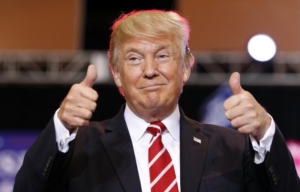By Aaron Mehta, Defense News–
President Donald Trump’s new National Security Strategy lays out a world where America is locked in global economic competition with both partners and potential adversaries.
Trump will unveil the NSS in a 2:00 PM EST speech, but a trio of senior administration officials previewed the document for reporters on Sunday. The theme of the document is what those officials called “principled realism” of an “ever-competitive world,” where the question of “how we advance our goals is more critical than ever.”
The NSS is the broadest of a series of upcoming strategic documents. Following the release of the National Security Strategy will come the National Defense Strategy, then in some order the Nuclear Posture Review, National Biodefense Strategy and Missile Defense Review, all of which are expected to be released in early 2018.
By design, there are no breakdowns on a country-by-country level, the officials said. Instead, expect to see broad statements, with the document broken down into four key categories:
- Protecting the homeland, which will include a focus on border security as well as missile defense.
- Promoting American prosperity, which emphasizes the economy as a national security concern and protecting what one official called the “national security innovation base,” a term the administration has coined “capture the broader ecosystem of activities we need to make sure to protect and promote to make sure we can continue to innovate as a nation.” This section will also emphasize the need to maintain an edge in areas such as space and cyber.
- Preserving peace through strength, a riff on the classic Reagan motto. This section covers the Pentagon’s concerns about modernization and readiness, looks at potential threats posed by competitors, and also supports upgrading the “instruments of information statecraft.”
- Advancing American interests, which focuses on identifying “new approaches to development” that can build up future American allies and trading partners. That includes looking to the private sector to lead in investments abroad as opposed to the traditional grant model used by the government development agencies.
When asked how this document, with its broad topics, differentiates from the Obama administration’s NSS, a second official pointed to two areas of emphasis – an “unprecedented” focus on homeland security, and the focus on the economy as a national security issue.
Indeed, the economic focus appears the be woven throughout the strategy, with the “serious intellectual property threat” posed by China a point of emphasis.
It appears the document will call for reforms to the CFIUS rules, which govern how foreign nations can invest in the U.S. and which are already being looked at in a bipartisan manner inside Congress. The strategy will also call for a look at how to better secure R&D centers, such as universities, in order to make sure American IP is protected.
“We’re looking at the measures we need to take to protect the national security
In addition, there will be “several” sections on the need for fair and balanced trade agreements between the U.S. and its partners overseas. “It features pretty significantly in the strategy,” the first official said.
Another thread the officials emphasized is the idea that “America First does not mean America alone,” a line promoted heavily by National Security Advisor H. R. McMaster at the Reagan Defense Forum earlier this month.
The first administration official described the document as presenting how America will “find areas of cooperation with our allies, our partners and sometimes, with our competitors.” However, the Trump administration will continue to “demand fair and reciprocal” economic agreements across the globe, again coming back to the economic focus of the Trump administration.
Other parts of the NSS will call for updates to NATO and the U.N, in line with previous calls from Trump; finding ways cooperate with Russia and China “where they can be found” while also being “vigilant of American interests;” and while the term “preemptive strike” does not appear in the document, it will make clear that the Trump administration “will defend our national interest and our values when threatened.”
While climate change is “not identified as a national security event,” “environmental stewardship” is discussed as an issue, the second official said.


Leave A Comment
You must be logged in to post a comment.